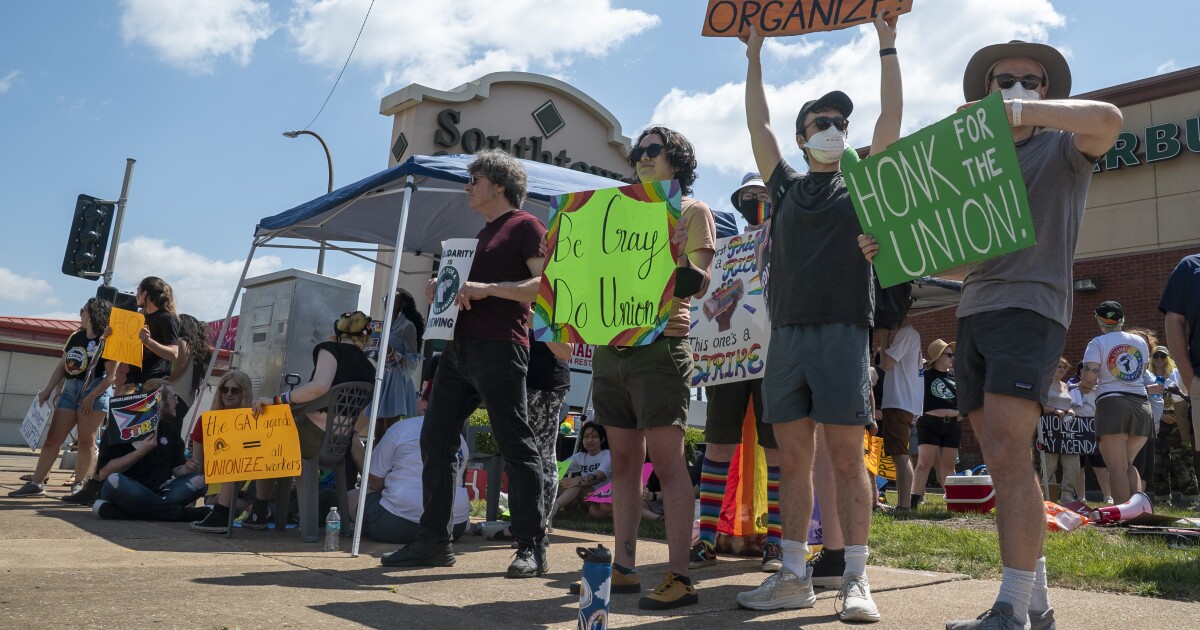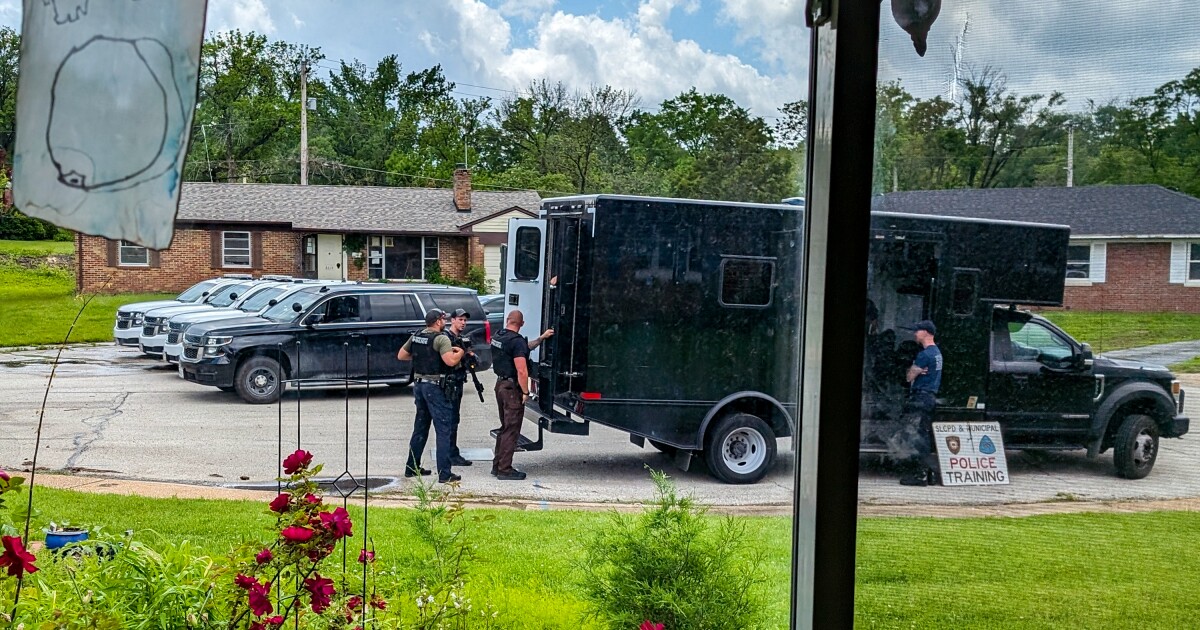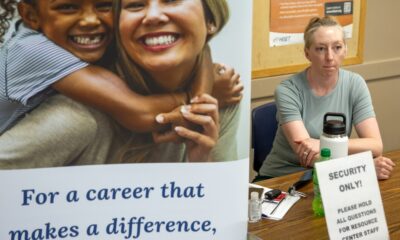Business
St. Louis Starbucks workers join national strike

Starbucks workers at four unionized stores in the St. Louis region walked off the job Monday, joining a nationwide strike at the coffee chain over the company not allowing dozens of stores to decorate for Pride month.Workers at some local stores say they’ve been pushed to remove decorations celebrating gay pride.“To come into a job every day that is supposed to have your back and they tell you to take down your Pride decorations, it’s kind of like a slap in the face,” said Jasper Berry, a barista at a Starbucks at Hampton and Wise in St. Louis.They said they had to take down Pride decorations a few weeks ago, despite the majority of employees being part of the LGBTQ+ community.This development troubles Berry, especially since Starbucks was one of the first places they felt they could comfortably and safely explore their gender identity, they said.“It’s really scary because Starbucks was the first place that I thought was a safe space for me to be able to grow and figure out who I was,” Berry said.The targeting of Pride displays makes other unionized Starbucks workers nervous, including Alexia Fisher, a barista trainer at the location at Kingshighway and Chippewa. She said she and her colleagues were asked to move a Pride flag that was prominently hung from the light fixtures.“Randomly, one day they said it was hitting customers in the head, which you’d have to be seven feet tall almost to hit it,” Fischer said. “The fact that this is happening has made us all a little bit uneasy, especially for a company that puts out this progressive front.”It’s a shared sentiment among Starbucks employees who demonstrated on Monday.“They market themselves as like a haven for queer people, queer people come to this job because maybe they can get health benefits,” said Jonathon Gamache, who works at a west St. Louis County Starbucks. “Now we’re seeing those benefits have been threatened for union partners.”In a statement, a Starbucks spokesperson denied the company has ever taken away or threatened to take away benefits available to employees. The spokesperson said that the company offers unwavering support for LGBTQ employees and that all employees have access to gender-affirming care, whether they’re unionized or not.Regardless, Berry said their store no longer feels like the safe space it once did.“I’m thankful for Starbucks for helping me discover who I am and discover a great group of people,” they said. “With all the pushback that we’re getting, it doesn’t feel like a safe space to even identify that I’m trans anymore.”Local organizers also used Monday’s strike to call for good faith contract negotiations that would guarantee better pay, health care coverage and sick and vacation time.“We don’t want what happens at our job to be up to Starbucks, because we’ve seen what they do with that power,” said Gamache. “We’ve seen how they abuse that, we’ve seen how they abuse us.”Gamache’s west St. Louis County Starbucks voted to unionize a little more than a year ago. In that time, the store has had seven managers and a slew of practices he considers retaliatory over the store’s workers’ decision to unionize, Gamache said.“None of us wear our union T-shirts at work. I wore my union T-shirt for every shift for two months and they started writing all of us up,” he said. “They’ve outright fired two people at our store that were vocally pro-union.”Others, like part-time or seasonal employees, didn’t receive schedules or were told their availability didn’t work, Gamache said.Eric Moore, the area director for Starbucks Workers United, said the company has had one of the most aggressive anti-union campaigns he’s experienced. As the chief negotiator for the union’s locations in St. Louis and Kansas City, Moore said he’s had close to 20 bargaining sessions with Starbucks attorneys that lasted at most five minutes each.“We’ve just never seen a corporation so dug in, or one individual in Howard Schultz who just refuses to give these workers a voice and concede any power,” he said. “All they want is a fair contract and to be treated like decent human beings at work.”A spokesperson for Starbucks disputes this as well, saying that the company is committed to good faith negotiations of a first contract for individual stores and that it’s been the Starbucks Workers Union that has been unresponsive to the bargaining process.
Business
St. Louis families say they are grateful for $500 monthly checks
Participants in St. Louis’ guaranteed basic income program say they appreciate the safety net the effort has provided.Five of the 540 recipients met Wednesday with Mayor Tishaura Jones and Treasurer Adam Layne to share how they are spending the money and what other resources the city can provide. The program uses $5 million in federal COVID relief funds, plus a $1 million donation from Jack Dorsey to give families $500 monthly checks.To be eligible for the program, families had to live in the city and be the parent or legal guardian of a minor enrolled in a city public or charter school. They could also make no more than 170% of the federal poverty level, which is about $53,000 for a family of four.“We were very specific and intentional about the families we wanted to reach, which were families who were too rich for benefits, but too poor for anything else,” Jones said.The participants can spend the money however they want. One mother who attended the roundtable uses the check to pay for groceries. The funds help another work fewer hours, giving her more time to spend with her daughter, who will be 5 in July.Travious Brooks is using his share to rebuild savings that were wiped out during the COVID-19 pandemic.“My kids are wanting to go on a vacation, so we’re saving up to do that,” he said.He also needs to make repairs to his house, which is more than 120 years old.
Eric Lee
/
St. Louis Public RadioTravious Brooks says he wants to save his money to take his kids on vacation.
All five of the roundtable’s participants said they are glad for the extra help. But they also expressed a need for things like safe transportation for children, more resources for small businesses, and financial literacy classes.“There are a lot of resources in the city, and sometimes they’re not all coordinated,” Layne said. “We’re working on trying to get a resource hub so one place where people can go to our city site, here are all the resources, they’re all connected.”Funding for the program is only available through mid-2025 and Brooks said that was on his mind as he thought about how to use his share.“That was one of the reasons, not knowing the longevity of the program, that I would rather just sit on the funds and have something in the event that anything happened I had something built up,” he said.Jones said she is looking for ways to extend and expand the program.
Business
Tech job listings decline puts focus on St. Louis startups
The effort to substantially grow the region’s technology workforce is facing stiff headwinds.St. Louis is dealing with some of the national employment trends in the sector, like layoffs and companies cutting back on hiring new positions.From 2022 and 2023, the total number of active job listings for tech positions dropped 45%, according to a March report from TechSTL, the region’s tech council. The report also finds the St. Louis region had steeper drops in active listings compared to the U.S. as a whole in that same time period.As stark as this news was for TechSTL Executive Director Emily Hemingway, it also offered a sense of relief, she said.“When this [report] came out, it was really validating for all of us because we had seen in life, in reality, that things had shifted,” Hemingway said.She cites two culprits for the current contraction: an end to the pandemic hiring spree in tech and the explosive growth of artificial intelligence prompting some companies to become leaner.While the report found the number of active job listings dropped dramatically between 2022 and 2023, overall employment in the local tech industry ticked up slightly, by 2%.This comes as the U.S. Bureau of Labor Statistics anticipates some tech-sector occupations like software developers, information security analysts and data scientists, will grow as much as 35% by 2032 compared to about 3% growth for all occupations in the country.Hemingway said that means the underlying skills for a technology-focused role are still in demand, just maybe not at a large firm.“When you have significantly fewer jobs, you can’t be dependent on our large anchor institutions or corporate partners to really drive the workforce,” Hemingway said. “These jobs that are being cut are largely in these larger hiring agencies.”She said the St. Louis region needs to prioritize the development and growth of local startups and entrepreneurs as a way to support the existing tech talent in the region.“If we can’t find these folks a good way to make money in St. Louis, they will either change their industry or they will change their town,” Hemingway said. “It is a race to support what we have here and give them a reason to stay in St. Louis.”
Eric Lee
/
St. Louis Public RadioResident companies are listed on a sign late last month in St. Louis’ Cortex district.
‘A lot of fluff in the startup ecosystem’An innovative idea typically forms the basis of new startups, but there can be a downside to focusing too much on pitching them, said Christian Johnson, who runs the geospatial startup Metis Analytics, which provides workflow management software for intelligence analysts.In the 8½ years that Johnson’s been involved in the local startup scene, he said he’s seen some organizations catering to startups favor pitching and promotion over concepts like how to build and scale a new venture.“There’s a lot of fluff in the startup ecosystem,” he said. “It becomes a fashion show basically, instead of it being about can you actually build a product that people want and that will buy from you?”Johnson also runs Founders Lounge, a weekly forum where entrepreneurs of any experience level can discuss their ideas and any obstacles they’ve faced. It also has events that bring in speakers from other cities who shed light on marketing, sales and the technical sides of a business, like choosing a cloud database or how to incorporate large language models into an application, he said.“Just different things that will help move the needle in your business that actually do help,” Johnson said.Spaces for these kinds of interactions are vital, yet lacking in St. Louis, he said, that adding other markets in the U.S. have established places like these.“This is not something that is foreign but something that is super powerful that we’re bringing to St. Louis,” he said.
Brian Munoz
/
St. Louis Public RadioGabe Angieri, Arch Grants’ executive director, at St. Louis Public Radio’s headquarters in Grand Center.
Financing and customersBeyond more programming to help startups with their business strategy, there’s the sticking point of securing local capital or customers that will invest in or buy a local company’s product.It’s something Arch Grants specifically looks for when vetting the companies it eventually supports, said Executive Director Gabe Angieri. The nonprofit awards grants to companies with high growth potential in St. Louis that are either already located in the region or that will relocate here, he said.“We want companies that see their long-term path to success in St. Louis and this region,” he said. “We put a high barrier to entry on that.”It helps when a startup, local or otherwise, can clearly articulate potential partners, customers or when it can point to people in the St. Louis region who have weighed in on its business plan or innovation, Angieri said. Locating capital and customers are frequent challenges for new ventures in the region, he added.“St. Louis is an extraordinarily generous city — there’s a lot of wealth in this region,” Angieri said. “It is not the most adventurous when it comes to investing in early-stage startups. And it is a high-risk endeavor, no question about it.”There is a push at the state level for tax credits for angel investing that could entice more early-stage investing. But even in the local biosciences sector, which has examples of successful startups that are now standalone companies or were acquired, lots of capital can be hard to come by.“There’s just fewer examples of people taking giant home run swings and succeeding,” said Tom Cohen, chief operating officer at Panome Bio, a local biotech startup.This can push local startups to look for capital or customers elsewhere, likely from the coasts, and that can leave startups asking, “Why am I here?” if their financial support is elsewhere, Angieri said.One solution he sees is in some of the existing large corporations in St. Louis working directly with local startups in addition to the dollars they already dedicate to organizations like Arch Grants, he said.“It’s shifting from a mindset of community-based philanthropy to a more risk-tolerant approach,” Angieri said. “To see the solutions and the innovations come out of the startup sector as viable options as you seek to address pain points in your own companies.”If local corporations started dedicating a portion of their budget to pilot with startups in St. Louis, it could unlock considerable growth for small to midsize ventures in the region, he said.
Eric Lee
/
St. Louis Public RadioPeople play a card game during a networking event hosted by Founders Lounge late last month at Aloft St. Louis Cortex Hotel.
‘Right now we’re whispering’Entrepreneurs are also responsible for driving this shift in perspective for local companies, argues Chris Ocasio, a server and bartender who’s recently started developing apps.“If we want them to listen, then we have to speak,” he said. “And right now we’re whispering.”When Ocasio first decided to pursue his own venture less than a year ago, he said he was struck by the level of support he received.“Two years ago, a year ago, I had no idea there was this type of ecosystem in St. Louis,” he said. “Everyone was excited to see someone hungry to get into the entrepreneurial space.”Ocasio argues not enough people or companies in the broader St. Louis community are aware of the innovations people like him are working on or how they can get involved in the community if they wanted to.“There’s no TikTok’s about this, you know? Like why can’t we do that,” he said. “We need to show that pride and get St. Louis talking about the fact that there’s innovators here, [that] we’re hungry [and] going to make it happen.”
National Geospatial Intelligence AgencyThe exterior of the new National Geospatial-Intelligence Agency in north St. Louis. The agency has plans to collaborate with more outsider organizations, academic institutions and private industry when its new headquarters in St. Louis fully opens in 2026.
A blueprint for successLeaders across St. Louis don’t have to look far for a potential blueprint on how to respond to the current job environment in the technology sector. The biosciences sector experienced a similar contraction about 20 years ago, said Justin Raymundo, BioSTL’s director of regional workforce strategy for the bioscience sector.“In the early 2000s, we really didn’t have what we would call a thriving entrepreneurial ecosystem or an innovation economy,” he said. “We focused particularly on having large corporations or large academic institutions.”St. Louis saw large companies leave the area or get acquired by firms outside the region, Raymundo said. The strategic response to this and the urban depopulation of the time was to create the Coalition of Plant Live Sciences (the precursor to BioSTL) that would focus on developing an ecosystem to support homegrown innovation in the biosciences and cushion against corporate downsizings, he explained.Two decades later, that strategy has paid off and led to key drivers of innovation in the Cortex Innovation District, BioGenerator Ventures, a dedicated fund for investing in and building biotech startups, and other markers of a healthy startup system where new ventures are making successful exits, he added.“That’s a story of how anchors came together in this community at a point when we really needed to invest,” Raymundo said.But it wasn’t cheap or necessarily easy, he added.“What we’re demystifying now is that a lot of this requires investment, particularly philanthropic investment, state and local investment, private-sector investment,” Raymundo said. “We’ve reached this point in our region over 20 years of a lot of patient capital and commitment.”Johnson, of Metis Analytics, said it’s worth it for St. Louis to make similar pushes now for other sectors like geospatial or artificial intelligence.“We have to do that,” he said. “There are more geospatial startups that are coming here from out of town. But also there needs to be more geospatial startups that are starting from here.”The National Geospatial Intelligence Agency has plans to collaborate with more outsider organizations, academic institutions and private industry when its new headquarters in St. Louis fully opens in 2026.It could create similar conditions in the biotech sector now, where ideas can spin out into new ventures, said Cohen with Panome Bio.“That seems like something that could really blow up,” he said. “And could be the nucleus that creates a whole new sector. We could become the space to build geospatial companies.”
Business
Police train in abandoned homes in U City Costco development

In 2008, Nichole Angieri opened her front door for the first time as a homeowner on Mayflower Court in University City. Over the next decade, she got to know her neighbors as part of the fabric of a multi-generational community. She walked to her favorite restaurants. She listened to birds in her backyard.“I have wonderful memories,” Angieri said, recalling the Easter egg hunts, gardens and kind neighbors who helped with her children when they were little.“My children grew up climbing all of the trees in all of the neighbors’ yards,” she continued. “It was our community.”Today, the street is unrecognizable to her. Nearly half its sixteen homes are vacant, abandoned in the aftermath of a yearslong development that erected a Costco in University City while pushing out immigrant-owned businesses.Two weeks ago, Angieri opened her door and saw something new on Mayflower Court: Numerous police vehicles and officers were staged at the entrances to homes, where they drilled on their positioning with battering rams and other tactics for forced entry. The officers came back to Mayflower multiple times to use the homes that once held Angieri’s neighbors as practice targets.Angieri called the drills “another violation against the residents of Mayflower Court’s ability to live peacefully and undisturbed” in a Tuesday email complaining to city officials.“We have already been disturbed by the noise from the construction, the light pollution that we now experience from the parking lots, and the removal of beloved trees that lined our streets,” she told St. Louis on the Air.The homes on Mayflower spent years in the shadow of the adjacent, $190 million Costco-anchored development. Other nearby neighborhoods were subject to buyouts and the threat of eminent domain. Mayflower was supposed to be next for that treatment — instead, commercial real-estate firm Seneca abruptly pulled out of the deal last summer, stunning homeowners who had refused to move.Larry Chapman, president and CEO of Seneca, blamed the reversal on losing key retailers, as well as rising interest rates. He told the Post-Dispatch in December 2023, “We are disappointed, just like the homeowners are, that we were unable to close.”Seneca quickly sold the seven homes it had bought on Mayflower. The new owner, Arnold-based Paisley Park LLC, allowed the St. Louis County Police Department to use the homes for tactics practice.“We train wherever people will give us facilities, buildings, businesses or homes,” Sgt. Tracy Panus confirmed. “We sign agreements with them.”Panus said that the training on Mayflower did not involve the use of loud noises like flashbangs or battering rams. We try to be as cognizant of the community that we’re in as possible.”Panus added that the department alerted University City to the training exercises. “We wouldn’t just go into a municipality and train there without them being aware of what’s going on,” she said.For Angieri, the new reality of her neighborhood is hard to stomach. She is adamant about staying in her home and standing up for what is left of her community.“My children unfortunately have spent the last seven years watching their neighborhood be dismantled. They have slowly watched neighbors move out. They have gone from a fully secure, safe neighborhood, and overnight, to a neighborhood with boarded-up buildings.”“Next,” she added, “is for me to continue to fight for my neighborhood.”To hear more about the police presence on Mayflower Court and how homeowners like Angieri are dealing with a development that’s reshaped their community, listen to St. Louis on the Air on Apple Podcast or Spotify or by clicking the play button below.
Why SWAT teams are using U City homes to train
Listen to Nichole Angieri and producer Danny Wicentowski on ‘St. Louis on the Air’
“St. Louis on the Air” brings you the stories of St. Louis and the people who live, work and create in our region. The show is produced by Ulaa Kuziez, Miya Norfleet, Emily Woodbury, Danny Wicentowski, Elaine Cha and Alex Heuer. Roshae Hemmings is our production assistant. The audio engineer is Aaron Doerr.
-

 Entertainment1 year ago
Entertainment1 year agoSt.Louis Man Sounds Just Like Whitley Hewsten, Plans on Performing At The Shayfitz Arena.
-

 Business1 year ago
Business1 year agoWe Live Here Auténtico! | The Hispanic Chamber | Community and Connection Central
-
Board Bills1 year ago
2022-2023 Board Bill 189 — Public Works and Improvement Program at the Airport
-

 Local News1 year ago
Local News1 year agoVIDEO: St. Louis Visitor Has Meltdown on TikTok Over Gunshots
-

 News1 year ago
News1 year agoTed Lasso-inspired pop-up bar now open in St. Louis
-

 Board Bills1 year ago
Board Bills1 year ago2022-2023 Board Bill 165 — Jefferson Arms Community Improvement District
-
Board Bills1 year ago
2022-2023 Board Bill 183 — Amending Ordinance Number 62885 known as the Capital Improvements Sales Tax
-
Board Bills1 year ago
2022-2023 Board Bill 180 — Right to Counsel for Tenants Facing Eviction












